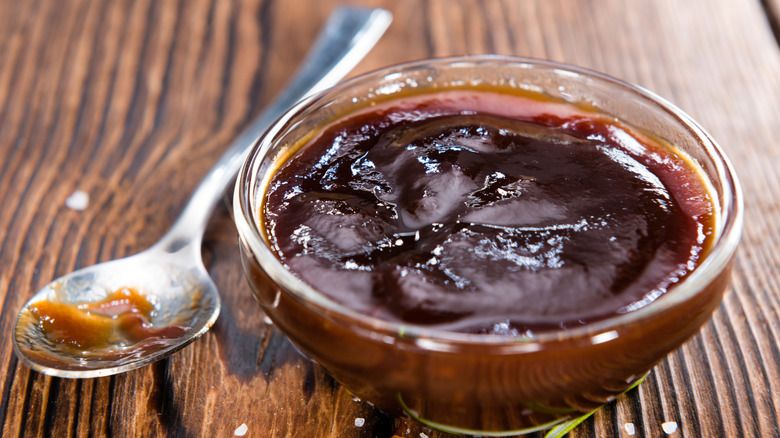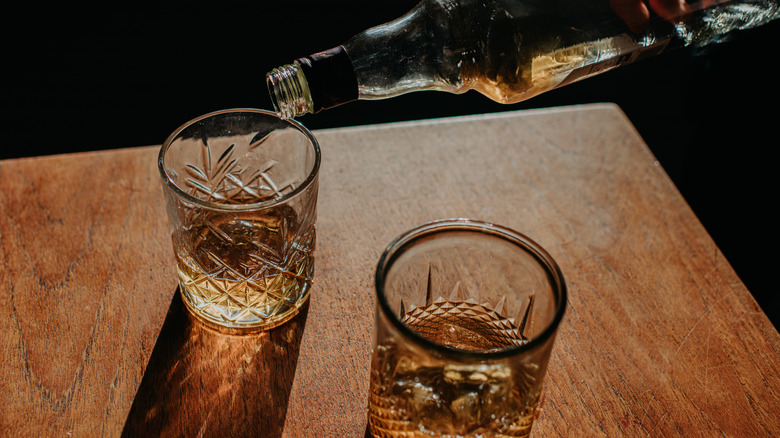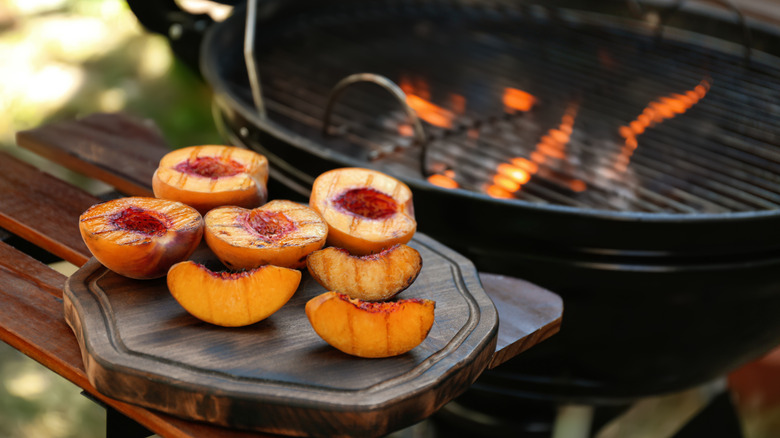Bourbon Gives BBQ Sauce A Major Upgrade. Here's How To Add It
We may receive a commission on purchases made from links.
Barbecue sauce is one of the great mainstays of American cookery. Its seemingly endless regional variations reveal a cuisine that's as diverse as it is delicious. Indeed, a person's favorite barbecue sauce can tell you a great deal about how they like to cook — whether they're obsessed with unearthing the secret to an amazing homemade sauce, or happy to rely on the classics, like Sweet Baby Ray's. With so many different variations comes the prospect of customizing your sauce to suit your tastes: Some go for the classic, clean flavor of a sauce made simply with ketchup, Worcestershire sauce, and brown sugar. Others reach for more unorthodox ingredients like (hear us out) coffee. But one boozy addition that's sure to take your sauce to the next level is just as much of a southern American icon as the sauce itself: bourbon.
Bourbon is the perfect way to introduce some remarkable complexity to your sauce, especially given how easy it is to add. It brings notes of vanilla and burnt caramel, as well as a deep woody, oaky undertone that'll deepen your sauce's flavor profile and bring together the sweetness and smokiness that define a great barbecue sauce. Bourbon's own sweetness will work in concert with staple ingredients like brown sugar or molasses, while the smooth, round flavors of a good aged whiskey will balance the tangy acidity of vinegar or tomato ketchup, resulting in a wonderfully composed sauce with a truly mature profile.
When and how should you be adding bourbon to your barbecue sauce
So, bourbon barbecue sauce is a match made in heaven. But how do you actually go about making one? The key to allowing those flavors to properly develop and meld with the rest of the sauce is to get that bourbon in there early on during the cooking process. This will allow the alcohol to evaporate off, leaving you with an intensified, deeply aromatic bourbon flavor without the kick you get from high-proof booze (which would otherwise overpower the sauce).
When combining the two, you don't want to drown your sauce in bourbon — a ratio of 3 tablespoons of the good stuff to every cup of sauce should be enough — though, of course, you can add as much or as little as you like. The best approach is to make a few test batches using different amounts of bourbon in each, and narrow down the perfect concentration for you. Bear in mind that too much bourbon will upset the delicate balance of flavors in your sauce — though if you do add too much, you can always compensate by adding more of your other ingredients: There's no such thing as too much barbecue sauce, after all, so once you've got an idea of the perfect ratio, just keep the sauce on a low simmer until most of the alcohol has cooked off (around 15 minutes or so should be enough). That's all there is to it!
Other barbecue bourbon sauce tips and tricks
Once you've got a batch of the best barbecue sauce you've ever made (hopefully, at least) you'll surely be itching to use it. Now, of course, there are the classic applications: pulled pork rolls, tender smoked brisket, and the like. But if you really want to take things up a notch, you might consider a more unusual combination: barbecue sauce and peaches. Trust us, this really does work. Bourbon pairs exceptionally with the sweet, southern flavors of a perfectly ripe peach, whether it is chopped finely and layered into a pulled pork sandwich (almost like a fruity southern slaw) or segmented and grilled to release its sugars, which then caramelize beautifully and take on a surprising depth of flavor.
Remember, your sauce is only as good as the ingredients you use, so make sure you pick out a good bourbon to ensure you get the most flavorful sauce possible. Some classics like Jim Beam Original, for example, should probably be left on the shelf: Their intense harshness will overpower the sauce. Instead, look for well-rounded aged bourbons — if you'd enjoy drinking it, you'll probably enjoy eating it, too! Once your sauce is done, make sure to refrigerate it: If stored properly, in an airtight container, it'll last for up to two weeks in the fridge — though we challenge you to resist it for that long!


